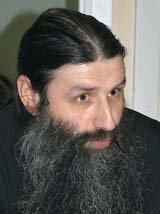The question of how to understand the abstention from marital intimacy when fasting is often asked by Foma readers in the column “Questions for the Priest”. The Foma journal has asked Archpriest Maxim Pervozvansky, cleric of the Holy Forty Martyrs of Sebaste Church in Moscow, Spassky Sloboda*, to answer this question.

Archpriest Maxim Pervozvansky
The Church definitely instructs us to abstain from marital intimacy during a fast, but we must understand that there are always nuances. There are dispensations for those who cannot completely restrain themselves. It is important to understand that the intimate relationship between a husband and a wife is not lust or simply desire. Also, by definition it is an expression of love. Therefore, abstinence from marital intimacy during a fast must in no way ruin this love. Abstinence is not worth practicing if one of the marital partners cannot or does not want to limit intimacy. In this case, fasting from physical relations is only worth practicing if there is mutual consent. If a couple fasts for the first time, no absolutely categorical and drastic practices are necessary, because there is a risk of destroying the couple’s relationship.
More than once I have seen a marital relationship sharply worsen because of abstaining from marital intimacy. In order not to be tempted, couples move to different rooms so as not to think about each other. They begin to communicate less and this leads to alienation. Just as the limitation of food can harm one’s physical health, family happiness risks being harmed when there is an unreasonable attention and focus on abstinence from intimate marital relations.
However, if we understand why we are doing this, then everything can be different. The useful sides of abstaining are revealed to us. Couples who observe fasting from physical intimacy are constantly supported by mutual interest in each other and will miss each other even more. Such couples turn out to be more strengthened in their relationship. Unfortunately, one of the problems in the modern world, in particular in the area of sexual intimacy – is satiety. Couples quickly become bored with each other and there is a desire to either find another partner or to start experimenting in their own bed. Such a problem doesn’t arise for those who choose abstention during the time of fasting. It is the same thing with the limiting of meals. For example, if we stop eating eggs, meat and drinking milk and kefir, then after the fast these ordinary products, even when prepared in the most simple way, seem incredibly tasty.
In observing fasting from physical intimacy, we are attempting to make the more lofty sides of our souls blossom with new life. “A full belly is deaf to prayer” – to paraphrase an old, but very dear proverb. If a couple practices abstinence from physical intimacy, they should be able to devote more attention to the spiritual relationship between each other. During the time when restraint from physical intimacy is practiced in family life, it is important to find another language for the expression of love. It is necessary to pray together, to try to say more pleasant things to each other, to smile, to exhibit tenderness and affection, and most importantly, to do this outside of an erotical context. To try to see in each other not only the attraction of the body, but above all, the unique beauty of the soul – this is the goal of abstinence from marital intimacy.
* – A sloboda is a rural locality. Historically, a sloboda was an area exempted from normal State obligations. Another possible translation of sloboda is “suburb.” – translator’s note
Translated from the Russian by Archpriest Peter Olsen















